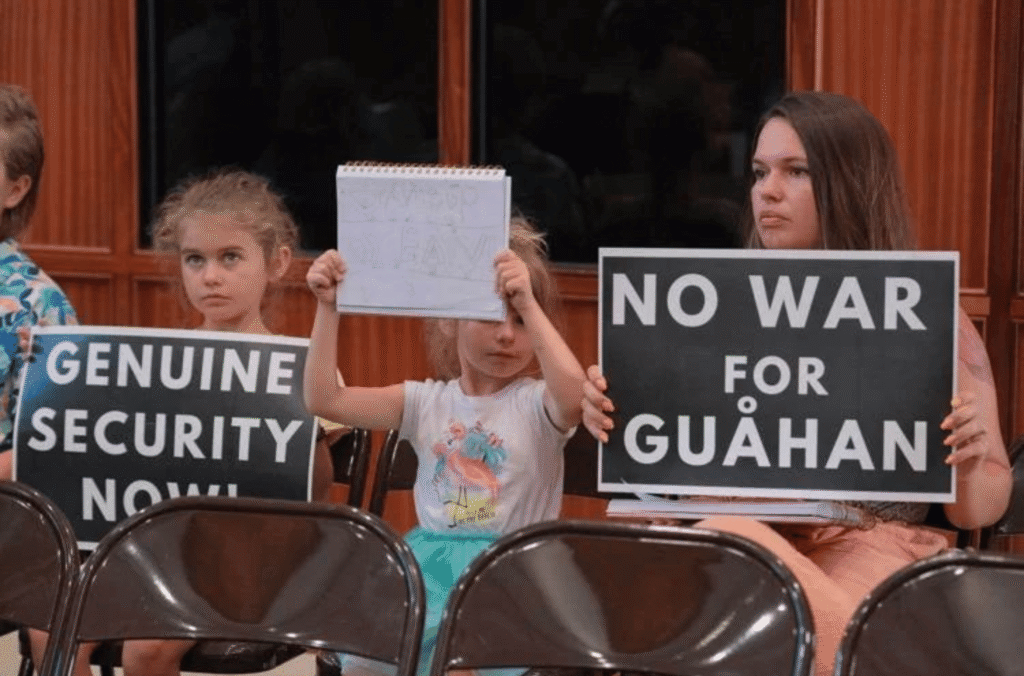HAGÅTÑA (The Guam Daily Post) — Residents testified for and against a proposed ban on nuclear energy at the Guam Congress Building on Tuesday.
Sen. Sabina Perez, the author of Bill 151-37, pointed to the potential risk of a catastrophic meltdown of nuclear reactors placed on the island, and the possibility of further contamination of the island from nuclear waste. Her measure would prohibit nuclear reactors big and small, and ban the disposal of radioactive material on the island.
Perez’s bill was introduced shortly after it became public that members of the U.S. Senate were looking to mandate a study on the use of nuclear microreactors for Guam in the upcoming national defense budget.
The island is already faced with enough nuclear-fallout induced illness, said veteran Robert Celestial, whose military unit was assigned to clean up contamination from atomic weapons testing in the Marshall Islands back in the late 1970s.
“Out of 8,000 military and civilian personnel stationed out there, only 300 of us are alive today,” said Celestial. “Three hundred that’s accounted for, my comrades.”
But the veteran, who for years has advocated for local residents to be included in federal aid for nuclear exposure, testified that he believed the number of people who died early due to fallout that spread to Guam has been severely undercounted.
Celestial said a ban on nuclear energy was needed as a preventive measure, given the Pentagon’s public plans to deploy mobile reactors to military outposts around the world, known as Project Pele.
“The issue is nuclear energy. We don’t want to have no nuclear plants – everybody knows the story with Chernobyl,” he said, referencing the 1986 nuclear disaster in the former Soviet Union.
Future burden
Nuclear waste was creating problems at various disposal sites all around the world, said Monaeka Flores of activist group Prutehi Litekyan, and Guam had nothing like the expertise or resources to handle nuclear waste.
“Right now if we look at sites around the world where it’s being buried, where nuclear waste is being buried, the deep geological deposits are extremely hazardous, and especially for us near our aquifer,” she said. “Our sole-source aquifer provides our island with 85% to 95% of our island’s drinking water, and any sort of deposit of radioactive or nuclear contaminated waste on Guam would directly risk the safety of our aquifer. Decommissioning a single nuclear reactor can take up to 20 years, and most countries only are able to plan for short-term strategies around 40 to 60 years – again leaving the burden for future generations.”
Disasters at the Fukushima-Daiichi Nuclear Power Plant, Chernobyl, and Three-Mile Island in the U.S. had all cost billions of dollars to clean up, she noted.
Objection to the process
Ron McNinch, a University of Guam political science professor testifying on his own behalf, said he objected to the ban proposed by Perez and believed a more science-based discussion should take place. McNinch said he had been trained in radiological emergency response, and has worked as the Guam Homeland Security citizen corps director.
He didn’t outright support the prospect of nuclear power for Guam, however, despite his opposition to the ban.
“What I’m concerned about is that nuclear power is the most highly regulated type of power in the United States,” McNinch said. “In the last 70 years, there have been technological improvements.”
Nuclear disasters that were being referred to all involved decades-old technology, which had since been improved upon.
“I think, in general, there needs to be more science and technology added to this discussion than I see in this particular bill,” McNinch said. “And nuclear power should be looked at as a potential solution, along non-ideological lines. In many of the discussions that are being proffered by various groups are very ideological, and very polarizing. And I think that more general consensus-oriented policymaking needs to be used in this particular policy area. And I don’t believe Bill 151 reflects a thoughtful process.”
Military impact unclear
But it’s unclear what impact Bill 151, if it were to become law, would have on any Department of Defense nuclear programs on island, according to Guam Environmental Protection Agency Administrator Michelle Lastimoza.
Though the U.S. Nuclear Regulatory Commission handled all civilian nuclear reactor regulations, she said, “DOD has an agreement that differs … from the NRC’s authority over civilian and commercial applications.”
Guam EPA did not have enough time to form a position for or against the bill, Lastimoza said.
“We will state that nuclear (power) on Guam would be serious business and can lead to serious environmental catastrophe with nearly irreparable damage to the island if we do not have the proper capacity to manage every element of this program,” she told lawmakers.

Residents hold signs against the production and use of nuclear energy on Guam during a public hearing Tuesday, Sept. 5, 2023, at the Guam Congress Building in Hagåtña.











